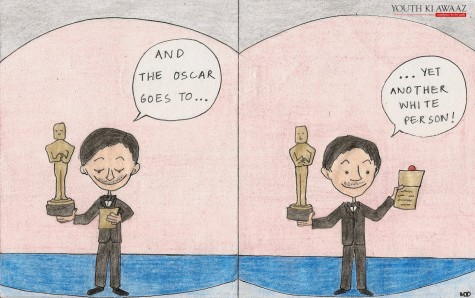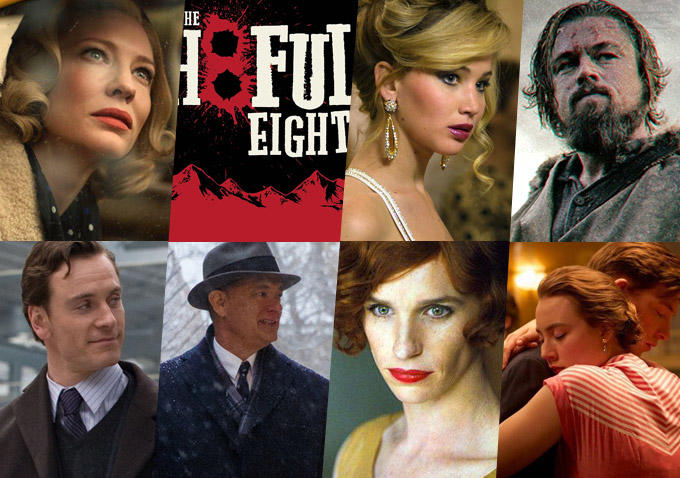Oscars whitewash: defamatory or coincidental?
Showcased are clips of Oscar nominated films. This year’s Academy nominations included only white individuals, causing some to question the equality of the Academy.
Put simply by Amanda Scherker of the Huffington Post: “Hollywood may have retired blackface and other racist caricatures, but discrimination is alive and well,” referring to the infamous whitewash of this year’s 88th Academy Awards. “Whitewash” refers to the elimination of minority nominations for any (this time, ALL) awards. The news of the lack of diversity in the nominees enraged certain celebrities so much that some, including Jada Pinkett Smith (Collateral) and Spike Lee (Chiraq, Do The Right Thing), have turned down their invitations to the annual awards event.
Shockingly enough, the concept of whitewashing nominees this year is not the first of its kind. Similar situations took place in a handful of other years: 1989, 1992, 1996, and 1998. The frequency of this event leads many to wonder who’s left in charge of the decision. While the demographics of the committee which votes on the nominees is kept largely under wraps, the Los Angeles Times reported that a majority of the committee consists of white, older men.
The initiation process is a relatively difficult one. To even be considered to be part of one of Hollywood’s most elite groups, one must be involved in motion picture production. On top of that, one cannot simply apply, they must be recommended by two current members of the academy.
So, with a relatively rigorous application process, can the blame be handed to a specific person? With the calamity that has broken out after the announcement of the nominations, some adjustments have begun to be made in hopes to rectify the wrongs. For example, the president of the Academy, Cheryl Boone Isaacs, has promised to double the number of women and diverse members by the year 2020. This no way excused the overt whitewash, yet it’s a step in not just the right direction, but the fair direction.

According to the two time Oscar winner Michael Caine, black actors must be “patient” for Oscar nominations.
Yet, with all the tension present, one must take a step back from fury and revisit the situation. The Oscars are based on movies produced in the year. While it’s easy to point fingers and distribute blame, it is possible that the movies which were considered for this year’s awards mostly consisted of white actors/actresses.
And those in the industry are not the only ones harboring opinions on the issue. With digital media playing such a focal point in the everyday life of the American teenager, many students at Central have formulated their own opinions on the issue:
“I think it’s their fault for not being good enough” senior Frank Saltiel said regarding the issue. Like Saltiel, many attribute the lack of diversity in the nominees to the lack of outstanding performances by those of color.
However, other students are left questioning why there is such an excessive focus on the race of the nominees: “They shouldn’t be arguing about the race of the nominees… they should focus more on their acting performance,” senior Sam Seymour said.
In light of recent racial tension situations, many individuals are quick to jump to the conclusion that the lack of diversity in the nominees is fully due to the presence of inequality. While it’s easy to pick a scapegoat, such as racial bias, taking the time to look at gigantic realm which is the movie industry can allow individuals to understand the variety of aspects which have resulted in the situation this year.

Senior Caroline Kealy, known to many as "Carol", can always be found with a coffee cup in hand. An avid fan of river otters, Caroline loves spending time...

When she's not working at the movie theatre or forcing her dogs to cuddle with her, Mackenzie Murtaugh is consistently reading at least 6 books at a time...

Senior Matt Stockmal lives and breathes the Hinsdale Library. When not found in other areas of the school, he can be found there reading, studying, or...












